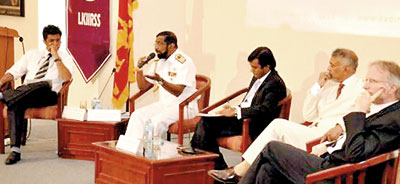News
Navy has a tough job with Indian fishermen
View(s):Seminar highlights struggle to stop Indian vessels from poaching in our territorial waters. Malaka Rodrigo reports
The Navy has a huge challenge in stopping Indian fishermen from entering the country’s territorial waters and helping themselves to Sri Lanka’s fish stocks, said Navy Commander Vice-Admiral Jayanath Colombage. “Thousands of Indian fishing trawlers are plundering our natural wealth in the ocean, but it’s like having our hands tied behind our back,” the Navy Commander said. “Our Navy must do its job, but the moment we act it becomes a bilateral or diplomatic issue.”

From L to r: Dr.Terney Pradeep Kumara, , Vice Admiral Jayanath Colombage, Asanga Abeyagoonasekera, Executive director of Lakshman Kadirgarmer Institute, Dr. SinhaRaja Tammita Delgoda – Senior Lecturer, Bandaranaike Centre for International Studies and Patrick T. Evans FAO Representative for Sri Lanka and the Maldives
Vice-Admiral Colombage was addressing a seminar on “Sri Lankas Ocean Resource: Our Hidden Gold Mine”, presented by the Lakshman Kadirgamar Institute of International Relations and Strategic Studies. The recent seminar brought together leading names in Indian Ocean studies and marine environment.
The damage that India’s bottom-trawling fishing vessels do to Sri Lanka’s marine ecosystem was underscored by Dr. P. B. Terney Pradeep Kumara, head of the Department of Oceanography and Marine Geology, University of Ruhuna.
Bottom trawling is trawling for fish along the sea floor. Two heavy metal panels weigh down the net so it touches the sea floor. As the nets are dragged, the delicate niche ecosystems get damaged. While shrimp are the main target in bottom trawling, this method of fishing brings in a huge by-catch. Dr. Kumara showed photographic evidence of eco-damage caused in India’s Rameswaram.
“Indian fishermen have used this destructive fishing method for decades on their side of the waters, and as a result the fish on their side are gone. That’s another reason they are invading our waters,” he said.
Dr. Kumara said the Indian side of the Gulf of Mannar is a “Man and the Biosphere” reserve, where rules should be observed for protecting the environment while allowing fishing. Over-fishing has depleted resources. Dr. Kumara asked whether declaring Sri Lanka’s side of the ocean a protected area would resolve matters. Vice-Admiral Colombage said the Sri Lanka Navy has strengthened its resources for cracking down on illegal fishing in our waters. The Navy seized 250 items of illegal fishing gear during a raid in Kalpitiya, where a number of dolphins had been killed. But Indian trawling is the most pressing issue, he said.
“We know that Tamil Nadu fishermen are poaching in our waters and no one denies that they are destroying a natural resource that’s ours. It is a question that begs an answer,” the Sri Lanka Navy chief said. The second part of the seminar was a discussion of Sri Lanka’s non-living marine resources, including the possibility of there being oil and gas in our territorial waters.
The seminar discussions will be published as a report.The seminar aimed to draw attention to Sri Lanka’s long ignored and now threatened marine resources, said Asanga Abeyagoonasekara, Executive Director of the Lakshman Kadirgamar Institute.
Follow @timesonlinelk
comments powered by Disqus


















